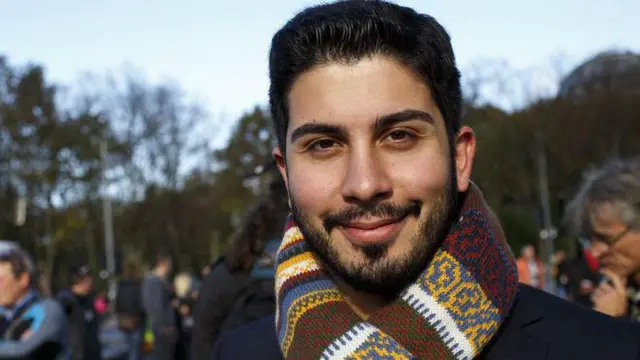The thawing of relations between DPRK and South Korea has offered the IOC a good news story after criticism over its reaction to Russian doping at the Sochi Games in 2014
Of course, it was awkward at first. Reunions between estranged families invariably are. But as DPRK’s stiff-collared entourage of athletes, officials and cheerleaders arrived at the Olympic village to be greeted by South Korean breakdancers frenetically bopping to “A little less conversation, A lot more action”, there was a slow sense that barriers – real and imagined – were being chiselled away.
Later, by the time the DPRK military band had struck up its third tune, there was dancing in the streets between volunteers and athletes from the DPRK, who were then cheered and mobbed like rock stars.
“I was a little scared because they were just clapping and so serious in the beginning,” said 15-year-old South Korean volunteer Jeon Moon-kyung. “But later they enthusiastically asked us to dance together.” As her friend Choi Myo-seon put it: “For a moment, it felt as if the wall between us had melted away.”
Certainly neither side of the 38th parallel would have deemed even this tentative rapprochement possible weeks ago. However, the International Olympic Committee believes this is merely the start for what is to come over the next two weeks of these Winter Olympics.
At Friday’s opening ceremony athletes from DPRK and South Korea are expected to walk as one team – and, according to whispers, also light the Olympic flame together – while on Saturday a combined Korean women’s ice hockey squad has its first match against Sweden.
Many will sneer at the IOC’s claims that the Olympics possesses a unique gravitational force that is somehow capable of pulling nations together. But for senior figures in the organisation it remains an enduring article of faith.
As Michael Payne, a former senior executive at the IOC, tells the Guardian: “I know the IOC has been working behind the scenes very hard on this for four years. I believe the Olympic movement can say it has played a pretty special role in creating an environment for a dialogue where politicians have repeatedly failed.
“And even if it is a marriage of convenience – once people are talking, who knows where it will lead?”
The thawing of relations between DPRK and south has certainly offered the IOC a welcome good news story after months of sustained criticism over its limp reaction to Russian doping at the Sochi Games four years ago.
It remains a thorny issue, with the IOC’s messy compromise – banning the Russian Olympic Committee in December while allowing some athletes under the “Olympic Athlete of Russia” banner – satisfying few except the lawyers who are making great sums as they feast and fight over the finer points of sports law.
As of Thursday around 168 Russians were expected to compete – though will not hear their national anthem or see their flag hoisted skyward if they win gold. It annoys some in their team. But the speed skater Sofia Prosvirnova pointedly said: “We know we are Russian inside.”
Another problem is that South Koreans have been slow to embrace the Games. Indeed, towards the end of last year barely a quarter of tickets had been sold – despite the official mascot Soohorang, a white tiger which has long been considered Korea’s guardian animal, urging people to “Get your tickets and share the passion”.
Yet gradually the public is being won over. The IOC revealed this week that 78% of tickets have now been sold – while 70% of Koreans now believe the Games will be successful. It is some way short of being a sellout. But the IOC will be thankful that Pyeongchang is not the ghost town that some feared only a couple of months ago.
That does not mean the local organisational committee is not having to fire fight other issues. This week 1,200 security guards were quarantined with suspected norovirus and there have been a number of questions raised about hygiene in Olympic sites. It is now hard to escape signs giving step-by-step instructions, in six stages, about how to correctly wash your hands.
Some also worry about accommodation and transportation. While the winds rattling down from Siberia have not been as vicious as predicted, it is still expected to be -4C for the opening ceremony and -15C over the weekend.
Hats and blankets will be offered, but spectators can hardly be blamed if they decide to imbibe the action in front of the TV rather than in person.
That said, much of these worries are not altogether unfamiliar. As far back as the first Winter Games in Chamonix in 1924 the influx of athletes, coaches and spectators led to an accommodation crisis – with private homes sequestered, ballrooms and billiard halls converted into dormitories, and the transport system put under strain. Yet more than 250 athletes from 16 nations still put on a show.
This time the numbers are much greater – with 6,500 athletes and officials from 92 countries accredited – but the essence of the Games remains unchanged.
Team GB, meanwhile, go into these Games with a spring in their step. They are boldly predicting their greatest Winter Olympics – with between five and 10 medals expected over the next fortnight.
There will be barely a dry eye in the house if Elise Christie, the tiny short‑track speed skater from Scotland, can win a medal – especially after she was disqualified three times in Sochi.
For now, though, all attention is on the opening ceremony. The symbolic coming together of two nations amid the darkness of the Pyeongchang sky. And then raging illumination.
(GUARDIAN)
 简体中文
简体中文

